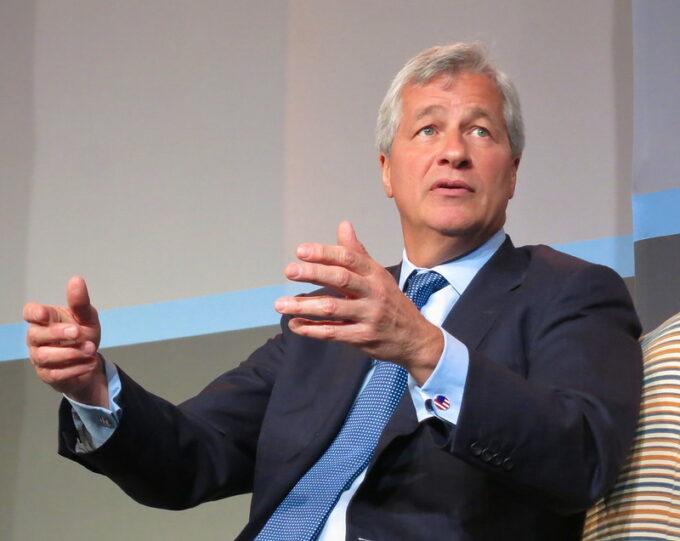
Photograph Source: Steve Jurvetson – CC BY 2.0
I’m sure most of my readers are familiar with Jamie Dimon, the longtime CEO of JP Morgan. He pocketed $34.5 million last year. If he sticks around for another three years as CEO, he stands to earn another $50 million, in addition to his normal compensation.
That’s pretty good pay by almost any standard, so why should he get a government salary. To be clear, I am not recommending that he get a government salary in addition to his enormous paycheck, I am suggesting that it replace his J.P. Morgan paycheck.
To get an idea of this comparison, the head of the Federal Deposit Insurance Corporation (FDIC), the agency that oversees Mr. Dimon’s bank, gets just under $181,000 a year. If we would rather make the comparison to the Federal Reserve Board, Jerome Powell makes $190,000 a year. That may seem like a bit too drastic of a pay cut for Mr. Dimon, so let’s multiply by ten and round up and give the guy $2 million.
Naturally, people will point out that Mr. Dimon runs a large and complex bank, one of the biggest in the world. This is true, but the FDIC and Fed are also large complex organizations with major responsibilities.
It’s also worth mentioning that Mr. Dimon’s tenure has hardly been unblemished. The bank’s trading division in London, known as the “London Whale,” famously lost over $6 billion in speculative trades in 2012.
More recently the bank paid out over $170 million to buy a company that ostensibly had a new method for helping students navigate the student loan system. It turned out the company actually had nothing. In other words, J.P. Morgan got ripped off big time.
But, we can say that J.P. Morgan is a private company and Jamie Dimon’s shareholders decide how much he should get paid. That’s actually a questionable claim for corporations in general. It’s difficult for a diverse group of shareholders to exercise much control over the CEO’s pay.
And, the corporate boards that most directly oversee management have little interest in reining in pay. In fact, they see their job as serving top management.
But apart from the general problem with corporate governance, there is a special issue with megabanks like J.P. Morgan. When there was a run on small and mid-size banks following the collapse of the Silicon Valley Bank, one of the places the money ran to, was huge banks like J.P. Morgan.
Depositors were not shifting their money to J.P. Morgan and other megabanks because they had great confidence that they were well-run institutions, they shifted their money because they thought there was no way on earth the government would let them fail. This means that no matter how badly their management may have messed up, the Fed would step in to keep them in business.
We saw this in the 2008 financial crisis, when two of the country’s three largest banks, Citigroup and Bank of America, essentially became wards of the state. The Fed set up a special lending facility for each, ensuring that they would survive the financial crisis and the Great Recession.
Having seen this recent experience, depositors are confident that this would again be the case. If boneheaded management brought a huge bank to the edge of bankruptcy, people are convinced that the government would again rush to the rescue.
Since J.P. Morgan and other huge banks enjoy this too-big-to-fail government insurance, it is reasonable for the government to impose conditions, like pay scales for top management. Of course, this is a free market economy.
We would not require, any banks to accept government rules on compensation for top management, that would just be a condition for getting too big-to-fail insurance. If a bank opted not to adjust its pay scales then we would get a very explicit statement from the Fed, Treasury, and FDIC that the bank will not be bailed out if it got into trouble. While insured deposits would be covered up to the deposit limits, everyone else’s money would be at risk. If J.P. Morgan and the others opted to go this route, they could pay Jamie Dimon whatever they wanted.
Undoubtedly many people will complain that the big banks would not be able to get innovative, entrepreneurial people as top executives at these big banks if they were only paid $2 million a year. That is possible, but on the other hand, why would we want big risk-takers running banks where the government will get the downside of their losing bets? These innovators can take their skills elsewhere.
It’s also worth reminding people that this is not just a Jamie Dimon issue. While his pay stands out as the CEO, there are many other top execs at J.P. Morgan who get paid many millions, or in some cases more than ten million a year. If the CEO got $2 million, their pay would be correspondingly lower.
There is a disturbing tendency among liberals to accept that the market just produces inequality and we need the government to step in to reduce inequality. In fact, we have let the right rig the market to generate the extremes of inequality we see. While government tax and transfer policy to reduce inequality is desirable, it is best to not structure the market to create so much inequality in the first place. (Yes, I am talking my book, Rigged [it’s free].)
This first appeared on Dean Baker’s Beat the Press blog.